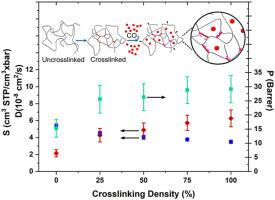Polymer ( IF 4.1 ) Pub Date : 2020-07-31 , DOI: 10.1016/j.polymer.2020.122789 Marcel Balçık , Sadiye Velioğlu , S. Birgül Tantekin-Ersolmaz , M. Göktuğ Ahunbay

|
In membrane-based CO2 separation, glassy polymeric materials suffer from plasticization phenomenon. To suppress plasticization, cross‐linking is a possible remedy, which however alters the separation performance significantly. This study investigates the effect of crosslinking on the CO2 transport properties and plasticization resistance of 2,2′-bis-(3,4-dicarboxyphenyl) hexafuoropropane dianhydride - bis [4-(4-aminophenoxy) phenyl] sulfone/3,5-diaminobenzoic acid (6FDA-pBAPS/DABA) copolyimide using molecular modeling and simulation tools that integrate quantum level calculations with Molecular Dynamics (MD) and Monte Carlo (MC) simulations. Mimicking the thermal crosslinking procedure, 25, 50, 75, and 100% crosslinked copolyimide structures are constructed for sorption and diffusion simulations and compared with the uncrosslinked polymer. The increased glass transition temperature of the polymers with crosslinking density confirms enhanced rigidity due to crosslinking, which reduces the packing efficiency of polymer chains and leads to higher fractional free volume, hence increasing the CO2 diffusivity. Analyses of CO2-accessible free volume evolution as a function of pressure show increased plasticization resistance with crosslinking. However, radial distribution function analyses indicate that crosslinking reduces the number of preferential sorption sites for CO2 molecules and prevents also the expansion of free volume elements around these sites. Consequently, CO2 solubility of the polymers decreases while diffusivity increases with increasing crosslinking density. This study reveals that the resultant effect of thermal crosslinking on 6FDA-pBAPS/DABA copolyimide is an increase in both CO2 permeability and plasticization resistance, which are the most desirable properties in CO2 separation applications.
中文翻译:

交联能否改善6FDA–pBAPS / DABA共聚酰亚胺中的CO 2渗透性和抗塑化性?
在基于膜的CO 2分离中,玻璃态聚合物材料遭受增塑现象。为了抑制增塑作用,交联是一种可能的解决方法,但是这会显着改变分离性能。这项研究调查了交联对CO 2的影响2,2'-双-(3,4-二羧基苯基)六氟丙烷丙烷二酐-双[4-(4-氨基苯氧基)苯基]砜/ 3,5-二氨基苯甲酸(6FDA-pBAPS / DABA)共聚酰亚胺的输运性能和耐增塑性使用分子建模和仿真工具,将量子能级计算与分子动力学(MD)和蒙特卡洛(MC)仿真集成在一起。模仿热交联程序,构建25%,50%,75%和100%交联的共聚酰亚胺结构用于吸附和扩散模拟,并与未交联的聚合物进行比较。具有交联密度的聚合物的玻璃化转变温度升高,证实了由于交联而提高的刚性,这降低了聚合物链的堆积效率并导致更高的自由体积分数,因此增加了CO 2。扩散性。对CO 2可接近的自由体积演变作为压力的函数的分析显示,随着交联,抗塑化性增强。但是,径向分布函数分析表明,交联减少了CO 2分子的优先吸附位点的数量,并且还阻止了自由体积元素在这些位点周围的膨胀。因此,随着交联密度的增加,聚合物的CO 2溶解度降低,而扩散系数增加。这项研究表明,热交联对6FDA-pBAPS / DABA共聚酰亚胺的影响是增加了CO 2的渗透性和抗塑化性,这是CO 2中最理想的性能 分离应用。











































 京公网安备 11010802027423号
京公网安备 11010802027423号